 The foundation of the Bible and Christianity is the opening story of Genesis – about how God created the world- especially its claim that God created Adam and Eve as the parents of all humanity. If this opening account is wrong, the very foundation for believing the Bible is destroyed! But if this account of creation is the pillar of truth, why are the two opening chapters so contradictory?
The foundation of the Bible and Christianity is the opening story of Genesis – about how God created the world- especially its claim that God created Adam and Eve as the parents of all humanity. If this opening account is wrong, the very foundation for believing the Bible is destroyed! But if this account of creation is the pillar of truth, why are the two opening chapters so contradictory?
GENESIS 1 or GENESIS 2?
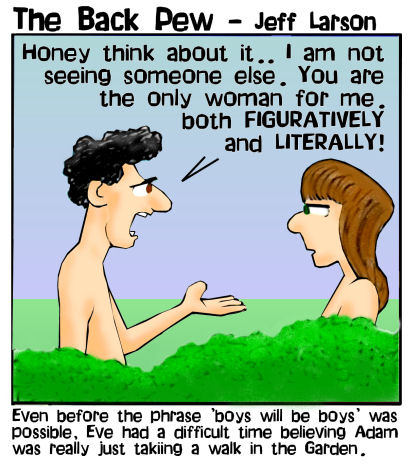 We cannot really understate the problem here. Anyone who claims that the Bible is the inspired Word of God cannot escape that there appears to be here a glaring contradiction. Sincere and well-meaning people have attempted to reconcile the two quite different Creation accounts by inventing a number of theories that inadvertently do more harm than their intended good since they make the Scriptures look cumbersome and in need of some drastic massaging to make sense.
We cannot really understate the problem here. Anyone who claims that the Bible is the inspired Word of God cannot escape that there appears to be here a glaring contradiction. Sincere and well-meaning people have attempted to reconcile the two quite different Creation accounts by inventing a number of theories that inadvertently do more harm than their intended good since they make the Scriptures look cumbersome and in need of some drastic massaging to make sense.
If the opening accounts of Genesis are not meant to be taken literally (and therefore, reliably) then perhaps they only serve as mythical stories with no moral implications. Therefore, those passages that do appear to be giving moral guidelines may only be allegorical and meant to be interpretted as mythical. Therefore, resolving the apparent contradiction between Genesis 1 and 2 is imperative for those who want to settle the question about whether the Bible is meant to be taken literally or read as a series of myths (with no moral absolutes).
WHAT ARE THE CONTRADICTIONS?
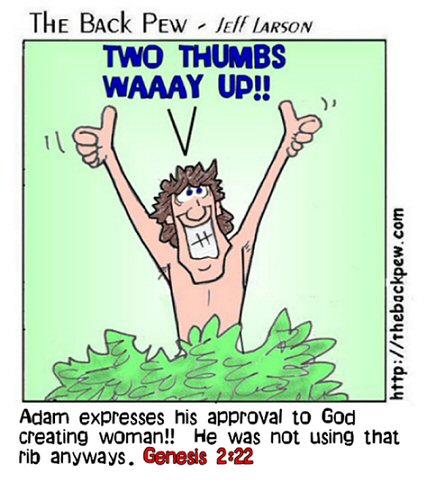 Genesis 1 lists a sequence of Creation events which climaxes in the Creation of Man. Genesis 2, on the other hand, seems to start with the Creation of Man and then seems to imply that everything else was created subsequently.
Genesis 1 lists a sequence of Creation events which climaxes in the Creation of Man. Genesis 2, on the other hand, seems to start with the Creation of Man and then seems to imply that everything else was created subsequently.
This appears to be an irreconcilable contradiction between the Creation accounts. Before we explore the details of these accounts we will automatically be answering several questions as we read the texts. Firstly, what is the text actually saying? What was intended by the texts? What are the implications of the texts?
WHAT DOES THE TEXT SAY?
Hebrew literature is structured differently to Western literature. It uses a literary device that is probably best understood in Western terms as “Headings and Body.” In Western literature we structure Headings and Body visually (like much of this article- headings are larger fonts and in bold type-face). But in Hebrew literature the structure is more oral. “Headings” were often short oral introductions which gave the broad sketch of unfolding historic details before these matters were dealt with further in the Body of the narrative. This is the case in Genesis 1. It was originally transmitted orally as an introduction to at least the first five chapters of Genesis. Within Genesis 1 we see-
- God created all matter from nothing (the universe had a beginning, often referred to as “The Big Bang”)
- Earth’s land forms were then distinguished from Earth’s seas (Gen. 1:5)
- Earth was originally enveloped in a dense atmosphere that prevented the created light of Genesis 1:3 from initially penetrating it. It was probably this atmosphere of gaseous compounds that later needed to be integrated into earth’s biosphere as the earth cooled from its original creation date and the necessary plant population was reached.
- Once Earth’s atmosphere had somewhat stabilised and been absorbed adequately by oceans and vegetation, through multiple cycles of seeding-growing-fruiting-composting, it became possible for the light of the Sun to penetrate Earth and establish the necessary distinction between night and day (Gen. 1:16)
- After the oceans of the world had the necessary balance of nutrients from the finely tuned atmosphere and oceanic vegetation, initial aquatic biological life was then created which then made possible the later creation of more highly developed sea creatures who needed to be sustained by consuming these smaller aquatic life forms. After this the next creation event was the more highly developed non-aquatic life forms such as birds (Gen. 1:20-22), then land animals (Gen. 1:24-25)
- The final Creation event was when mankind was created (Gen. 1:26-27). Mankind was then commissioned to populate the Earth (Gen. 1:28).
Of particular interest is what the text does not say. While it separates each creation event with the Hebrew word “yom” (frequently translated “day”) it does not say that this “yom” was a 24-hour period. In fact, the Hebrew word “yom” is variously translated: ‘week‘ (Gen. 2:4), ‘long time‘ (Gen. 26:8; Num. 20:15), ‘time‘ (Prov. 25:13), and ‘year‘ (Lev. 25:29). This is no small point in attempting to reconcile Genesis 1 and 2. Honest readers of the Bible should at least be open to the possibility (if not likelihood) that the Creation “days” were periods of unstated time rather than a series of 24-hour periods.
But some see Genesis 2 saying-
- The Earth was created, but there was no vegetation prior to the Creation of Adam
- There were no animals created prior to Adam
- Adam was created first, then animals, then Eve.
But let’s have a closer look at Genesis 2-
Genesis 2:1-3 is a recap of Genesis 1. The opening chapter of Genesis is written two perspectives. Firstly, from the perspective of looking at earth, then secondly from the perspective of being on earth. Then Genesis 2, a recapping, is now written from the perspective of Eden. Genesis 2:4 is not introducing an alternative Creation account. When it says-
These are the generations
of the heavens and the earth when they
were created,
in the day that the LORD God made the
earth and the heavens.
Some claim that Genesis 2 is an alternative Creation account introduced by verse 4 since Genesis 1 describes Creation taking place over a week (6 days plus 1 day of rest), and this introduces a Creation account that takes place over a day. But I have already shown that the Bible uses the word yom to describe varying periods of time which the reader can determine by the context in which it is used. Therefore, the context of ‘yom’ in Genesis 2:4 is best understood as referring to the same thing as the verses immediately prior to it: the Creation Week. Thus Genesis 2 is not claiming to be an alternative Creation account, but a more detailed account of one particular aspect: the creation of Adam and Eve.
In Genesis 2:5 it says: “When no bush of the field was yet in the land and no small plant of the field had yet sprung up–for the LORD God had not caused it to rain on the land, and there was no man to work the ground,” it is not saying that there was no vegetation on the earth. It is saying that in one particular area where God was about to create Adam, there was bare ground. It then goes on to say that once God had formed Adam, He made a garden (Eden) for Adam to tend. In Genesis 2:19 it does not say that God then created animals which He then brought to Adam to name. It says that God brought animals and birds that He had previously formed to Adam to name. For Adam to have carefully inspected every animal and bird and given them names obviously means that the “yom” in question here is considerably longer than a 24-hour period. Finally, God created Eve from one of Adam’s “ribs” and thus our insight into the account in Genesis 1 of the sixth ‘Creation Day’ is not contradicted by Genesis 2 but complemented by it.
IMPLICATIONS
“Haven’t you read,” he replied, “that at the beginning the Creator ‘made them male and female,’
Jesus Christ, Matthew 19:4 (NIV)
The Bible’s foundation for its truth claims and moral imperatives (its right to tell us what to do) is based upon the truthfulness of the Genesis Creation account. Jesus Christ was very emphatic about the truth of Genesis 1-2 when He uttered the above words in Matthew 19:4. Therefore, if Christ was wrong about God creating Adam and Eve, what else might He have been wrong about? But if, as has been demonstrated, Genesis 1 and 2 are not contradictory, but indeed complementary, then both the Bible and Christ have built their commandments upon a foundation of truth- that God is the rightful Creator and Lord over His Creation which He will one day judge according to their faithfulness to His commands.
For the wrath of God is revealed from heaven against all ungodliness and unrighteousness of men, who by their unrighteousness suppress the truth. For what can be known about God is plain to them, because God has shown it to them. For his invisible attributes, namely, his eternal power and divine nature, have been clearly perceived, ever since the creation of the world, in the things that have been made. So they are without excuse.
Romans 1:18-20
Amen.
© Dr. Andrew Corbett, July 25th 2006
This article may be copied and distributed if due credit is given to the author, the article is not altered, and the website- https://www.findingtruthmatters.org – is hyperlinked or referenced.
1 Comment
Submit a Comment
-
Sale!
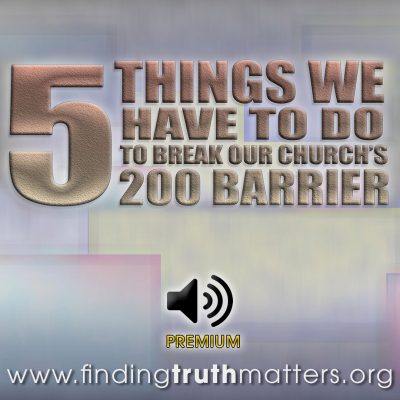
5 Things We Need To Do To Break Our Church’s 200 Barrier, Premium Audio
Original price was: $1.75.$0.95Current price is: $0.95. -
Sale!

A Morning With Izaak Walton – The Compleat Man, Premium Audio
Original price was: $1.75.$1.25Current price is: $1.25. -
Sale!
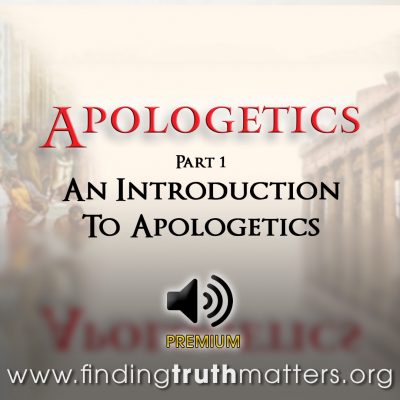
Apologetics Part 1 – Introduction To Apologetics, Premium Audio
Original price was: $1.75.$0.95Current price is: $0.95. -
Sale!
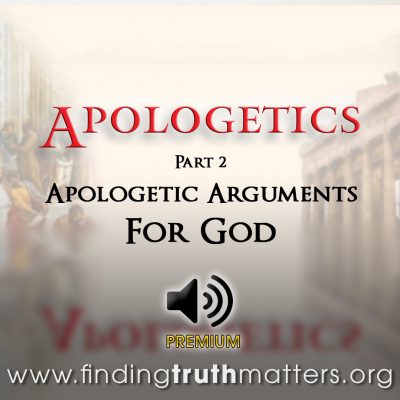
Apologetics Part 2 – The Apologetic Arguments For God, Premium Audio
Original price was: $1.75.$0.95Current price is: $0.95. -
Sale!
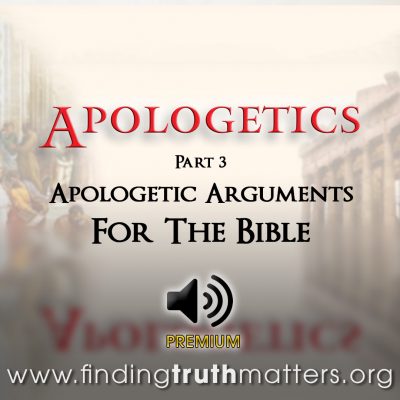
Apologetics Part 3 – The Apologetic Arguments For The Bible, Premium Audio
Original price was: $1.75.$0.95Current price is: $0.95. -
Sale!
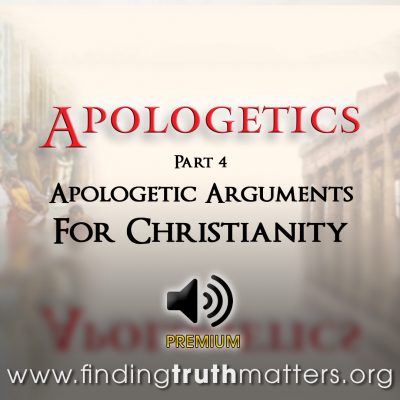
Apologetics Part 4 – The Apologetic Arguments For Christianity, Premium Audio
Original price was: $1.75.$0.95Current price is: $0.95.







































I am right there with you.